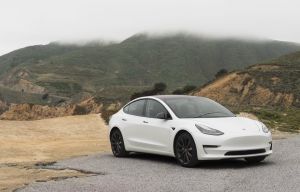Tesla has officially joined BMW and major Chinese automakers in a legal battle against EU-imposed tariffs on electric vehicles imported from China. The lawsuit, filed in the General Court of the European Union (CJEU), signals an escalating dispute between Tesla CEO Elon Musk and European regulators over trade policies affecting the fast-growing EV market.
The legal challenge, confirmed on Jan. 27, follows the European Commission’s decision to impose tariffs on Chinese-made EVs in October 2024 after an anti-subsidy investigation. Despite Tesla receiving the lowest tariff rate at 7.8%, the company is pushing back against the broader policy, which impacts not only Chinese automakers but also European brands manufacturing in China, such as BMW.
Why Did the EU Impose Tariffs on Chinese EVs?
The European Commission launched an investigation into Chinese EV manufacturers, alleging that they benefited from unfair government subsidies. These included:
- Soft loans from Chinese state banks
- Favorable land deals for factory development
- Subsidies for suppliers to lower production costs
These advantages, according to EU officials, allowed Chinese-made EVs to be sold at artificially low prices, making it difficult for European automakers to compete.
As a result, the EU introduced additional tariffs ranging from 7.8% for Tesla to 35.3% for other Chinese automakers, on top of the existing 10% import tariff applied to foreign carmakers.
Tesla’s Stake in the Dispute
Tesla’s Shanghai Gigafactory is a key production hub for its Model 3, which is exported to Europe. In 2023, electric vehicles made in China accounted for 20% of all EV sales in the EU, with Tesla alone making up 28% of those imports, according to the European Federation for Transport and Environment.
While Tesla’s tariff rate is lower than its competitors, the company argues that the import duties create unnecessary trade barriers and increase costs for European consumers. BMW, BYD, Geely, SAIC, and the China Chamber of Commerce for Import and Export of Machinery and Electronic Products (CCCME) have also filed lawsuits against the EU’s decision.
How Tesla and Automakers Are Adapting
In response to the tariffs, Tesla has adjusted its production and supply strategy:
- Berlin Gigafactory Focus: Tesla is ramping up local production of Model Y in Germany to reduce reliance on Chinese imports.
- Shanghai Exports Shift: Tesla continues to export Model 3s from its Shanghai factory, though higher tariffs could impact pricing and demand.
Other automakers are also reconsidering their supply chains. BMW, which produces a significant number of vehicles in China, may need to adjust its pricing strategy for the European market. Chinese EV makers, like BYD and Geely, are exploring options to expand production in Europe to avoid tariffs altogether.
What’s Next?
Tesla’s lawsuit is now before the General Court of the European Union, the second-highest court in the EU. The legal proceedings are expected to last around 18 months, after which the ruling can be appealed to the European Court of Justice.
The European Commission has defended its decision, maintaining that the tariffs are necessary to protect European manufacturers from unfair competition. A spokesperson for the Commission stated that the EU is prepared to argue its case in court.
This legal battle has far-reaching implications for Tesla, Chinese automakers, and global trade relations. If Tesla and other challengers succeed, it could force Brussels to reconsider its tariff policies, potentially reshaping the EV market in Europe. However, if the EU upholds the tariffs, automakers may have to accelerate investment in European production facilities or explore alternative markets.
With rising tensions between the EU, China, and the U.S., the outcome of this case could be a defining moment in the global EV industry.





